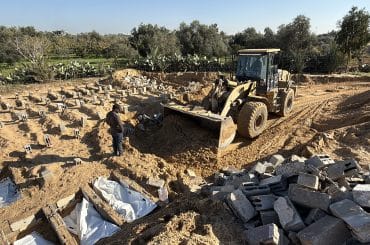In “As it Shrinks, the Dead Sea Nourishes Promises of an Economic Bloom,” [New York Times, yesterday, p. A8], Isabel Kershner presents a rosy picture of what she calls the Israeli “kibbutz” of Kalia, situated on the shores of Dead Sea. Kalia is, in actuality, an illegal Jewish-only settlement implanted in the Occupied Palestinian West Bank by Israel. (All settlements in the Occupied Palestinian West Bank are illegal under international law.).
But Kalia is not just any settlement: Kershner fails to mention that it is a co-owner of Ahava Dead Sea Laboratories (Kalia holds 7.5% of the company’s shares), a cosmetics firm whose main factory is also located on stolen Palestinian territory. Ahava is the target of a growing international boycott campaign because of its illegal practices, including the sourcing of raw materials from from Palestinian land. Indeed, sources inside Israel allege that Ahava excavates mud used in its products from the shores of the very settlement of Kalia described in Kershner’s article. This excavation and export of minerals in occupied territory is against international law (the Geneva Conventions explicitly forbid the “exploitation of occupied resources by the occupying power”).
Kershner, by withholding these unsavory facts, attempts to make her readers believe that, instead, the northern shores of the Dead Sea are some kind of Middle Eastern melting pot, where young Palestinian men lounge on beaches adjacent to those hosting Ultra-Orthodox Jewish men. The fact that Palestinians cannot use the Jewish-only roads built by Israel in the Occupied Territories to reach those shores, making the one-hour trip from Nablus stretch to upwards of an entire day of travel, doesn’t merit Kershner’s attention.
But it is Kershner’s reported conversation with a settlement resident that should send chills up the spine of any observer of American coverage of Israel’s occupation project:
“While the Palestinians claim about 25 miles of shoreline that lie in the West Bank as part of a future state, Aviv Cohen, a site manager who lives at the settlement, said the negotiations were not his business. The settlement, which is a small kibbutz, or communal farm, is investing heavily, with plans to build a restaurant and a visitors center, he said.”
Cohen’s (and Kershner’s) blithe disregard for the human and political tragedy unfolding in the Occupied Territories is a perfect illustration of why the Boycott, Divestment and Sanctions (BDS) Movement is essential. As a settler, Cohen is free to develop his business without considering the political circumstances in which he lives. In other words, the fact that he is an occupier living on occupied land is of no concern to him. He can continue developing Kalia beach, catering to tourists, and profiting from the occupation. The occupation has become so comfortable for (Jewish) Israelis, even for the ones living in settlements, that they can declare, as Cohen does, that it is not their business. And Kershner can describe Ahava’s business as "the relatively harmless cosmetics industry…"
From this point of view, BDS is a wake-up call, reminding Israelis that there are indeed consequences to occupying another people’s land, expropriating their resources, restricting their movement, and violating their human rights. As recent boycott actions against Ahava and other settlement trade outfits demonstrate, there is hope that the shores of the Dead Sea will soon be free from illegal exploitation.
Nancy Kricorian is a writer and activist in New York City. She is the campaign manager for CODEPINK’s Stolen Beauty Ahava boycott campaign.

